Developmental Psychology: Reflection on Social Initiation and Sexual Activity
VerifiedAdded on 2023/04/23
|6
|2153
|65
AI Summary
This essay reflects on two significant stages of adult life - social initiation and sexual activity - through the theoretical models of Pavlov and Piaget in developmental psychology.
Contribute Materials
Your contribution can guide someone’s learning journey. Share your
documents today.
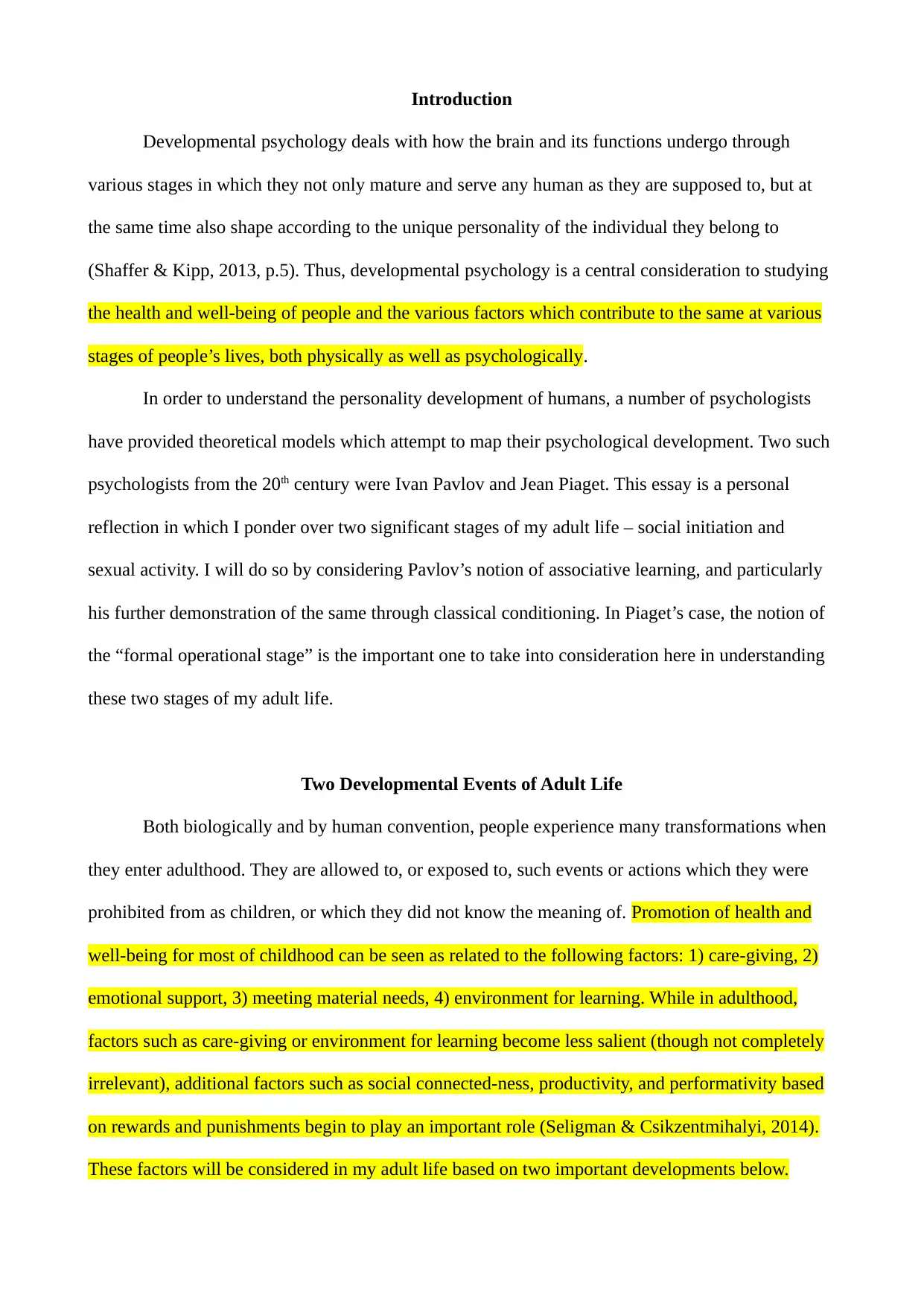
Introduction
Developmental psychology deals with how the brain and its functions undergo through
various stages in which they not only mature and serve any human as they are supposed to, but at
the same time also shape according to the unique personality of the individual they belong to
(Shaffer & Kipp, 2013, p.5). Thus, developmental psychology is a central consideration to studying
the health and well-being of people and the various factors which contribute to the same at various
stages of people’s lives, both physically as well as psychologically.
In order to understand the personality development of humans, a number of psychologists
have provided theoretical models which attempt to map their psychological development. Two such
psychologists from the 20th century were Ivan Pavlov and Jean Piaget. This essay is a personal
reflection in which I ponder over two significant stages of my adult life – social initiation and
sexual activity. I will do so by considering Pavlov’s notion of associative learning, and particularly
his further demonstration of the same through classical conditioning. In Piaget’s case, the notion of
the “formal operational stage” is the important one to take into consideration here in understanding
these two stages of my adult life.
Two Developmental Events of Adult Life
Both biologically and by human convention, people experience many transformations when
they enter adulthood. They are allowed to, or exposed to, such events or actions which they were
prohibited from as children, or which they did not know the meaning of. Promotion of health and
well-being for most of childhood can be seen as related to the following factors: 1) care-giving, 2)
emotional support, 3) meeting material needs, 4) environment for learning. While in adulthood,
factors such as care-giving or environment for learning become less salient (though not completely
irrelevant), additional factors such as social connected-ness, productivity, and performativity based
on rewards and punishments begin to play an important role (Seligman & Csikzentmihalyi, 2014).
These factors will be considered in my adult life based on two important developments below.
Developmental psychology deals with how the brain and its functions undergo through
various stages in which they not only mature and serve any human as they are supposed to, but at
the same time also shape according to the unique personality of the individual they belong to
(Shaffer & Kipp, 2013, p.5). Thus, developmental psychology is a central consideration to studying
the health and well-being of people and the various factors which contribute to the same at various
stages of people’s lives, both physically as well as psychologically.
In order to understand the personality development of humans, a number of psychologists
have provided theoretical models which attempt to map their psychological development. Two such
psychologists from the 20th century were Ivan Pavlov and Jean Piaget. This essay is a personal
reflection in which I ponder over two significant stages of my adult life – social initiation and
sexual activity. I will do so by considering Pavlov’s notion of associative learning, and particularly
his further demonstration of the same through classical conditioning. In Piaget’s case, the notion of
the “formal operational stage” is the important one to take into consideration here in understanding
these two stages of my adult life.
Two Developmental Events of Adult Life
Both biologically and by human convention, people experience many transformations when
they enter adulthood. They are allowed to, or exposed to, such events or actions which they were
prohibited from as children, or which they did not know the meaning of. Promotion of health and
well-being for most of childhood can be seen as related to the following factors: 1) care-giving, 2)
emotional support, 3) meeting material needs, 4) environment for learning. While in adulthood,
factors such as care-giving or environment for learning become less salient (though not completely
irrelevant), additional factors such as social connected-ness, productivity, and performativity based
on rewards and punishments begin to play an important role (Seligman & Csikzentmihalyi, 2014).
These factors will be considered in my adult life based on two important developments below.
Secure Best Marks with AI Grader
Need help grading? Try our AI Grader for instant feedback on your assignments.
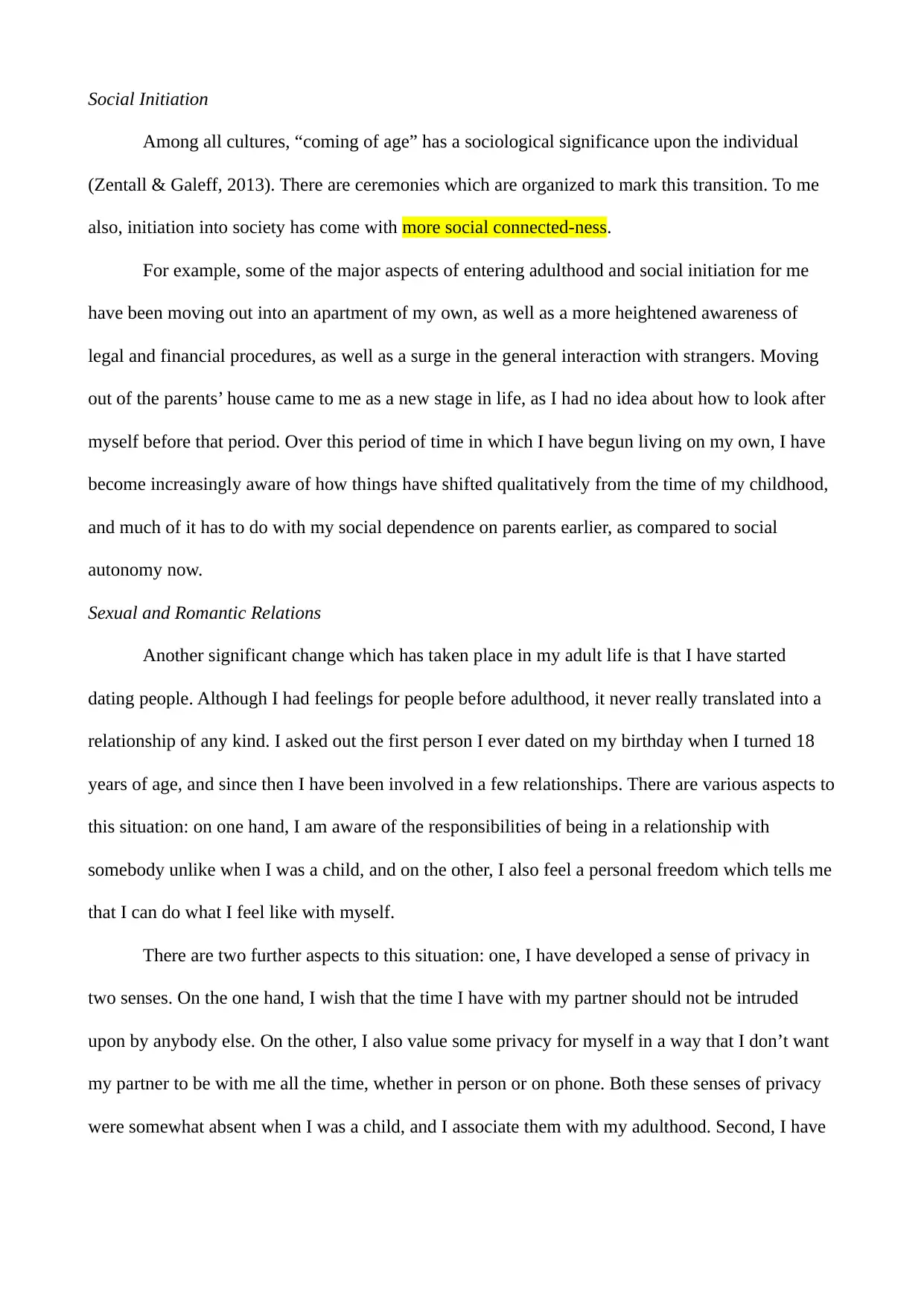
Social Initiation
Among all cultures, “coming of age” has a sociological significance upon the individual
(Zentall & Galeff, 2013). There are ceremonies which are organized to mark this transition. To me
also, initiation into society has come with more social connected-ness.
For example, some of the major aspects of entering adulthood and social initiation for me
have been moving out into an apartment of my own, as well as a more heightened awareness of
legal and financial procedures, as well as a surge in the general interaction with strangers. Moving
out of the parents’ house came to me as a new stage in life, as I had no idea about how to look after
myself before that period. Over this period of time in which I have begun living on my own, I have
become increasingly aware of how things have shifted qualitatively from the time of my childhood,
and much of it has to do with my social dependence on parents earlier, as compared to social
autonomy now.
Sexual and Romantic Relations
Another significant change which has taken place in my adult life is that I have started
dating people. Although I had feelings for people before adulthood, it never really translated into a
relationship of any kind. I asked out the first person I ever dated on my birthday when I turned 18
years of age, and since then I have been involved in a few relationships. There are various aspects to
this situation: on one hand, I am aware of the responsibilities of being in a relationship with
somebody unlike when I was a child, and on the other, I also feel a personal freedom which tells me
that I can do what I feel like with myself.
There are two further aspects to this situation: one, I have developed a sense of privacy in
two senses. On the one hand, I wish that the time I have with my partner should not be intruded
upon by anybody else. On the other, I also value some privacy for myself in a way that I don’t want
my partner to be with me all the time, whether in person or on phone. Both these senses of privacy
were somewhat absent when I was a child, and I associate them with my adulthood. Second, I have
Among all cultures, “coming of age” has a sociological significance upon the individual
(Zentall & Galeff, 2013). There are ceremonies which are organized to mark this transition. To me
also, initiation into society has come with more social connected-ness.
For example, some of the major aspects of entering adulthood and social initiation for me
have been moving out into an apartment of my own, as well as a more heightened awareness of
legal and financial procedures, as well as a surge in the general interaction with strangers. Moving
out of the parents’ house came to me as a new stage in life, as I had no idea about how to look after
myself before that period. Over this period of time in which I have begun living on my own, I have
become increasingly aware of how things have shifted qualitatively from the time of my childhood,
and much of it has to do with my social dependence on parents earlier, as compared to social
autonomy now.
Sexual and Romantic Relations
Another significant change which has taken place in my adult life is that I have started
dating people. Although I had feelings for people before adulthood, it never really translated into a
relationship of any kind. I asked out the first person I ever dated on my birthday when I turned 18
years of age, and since then I have been involved in a few relationships. There are various aspects to
this situation: on one hand, I am aware of the responsibilities of being in a relationship with
somebody unlike when I was a child, and on the other, I also feel a personal freedom which tells me
that I can do what I feel like with myself.
There are two further aspects to this situation: one, I have developed a sense of privacy in
two senses. On the one hand, I wish that the time I have with my partner should not be intruded
upon by anybody else. On the other, I also value some privacy for myself in a way that I don’t want
my partner to be with me all the time, whether in person or on phone. Both these senses of privacy
were somewhat absent when I was a child, and I associate them with my adulthood. Second, I have
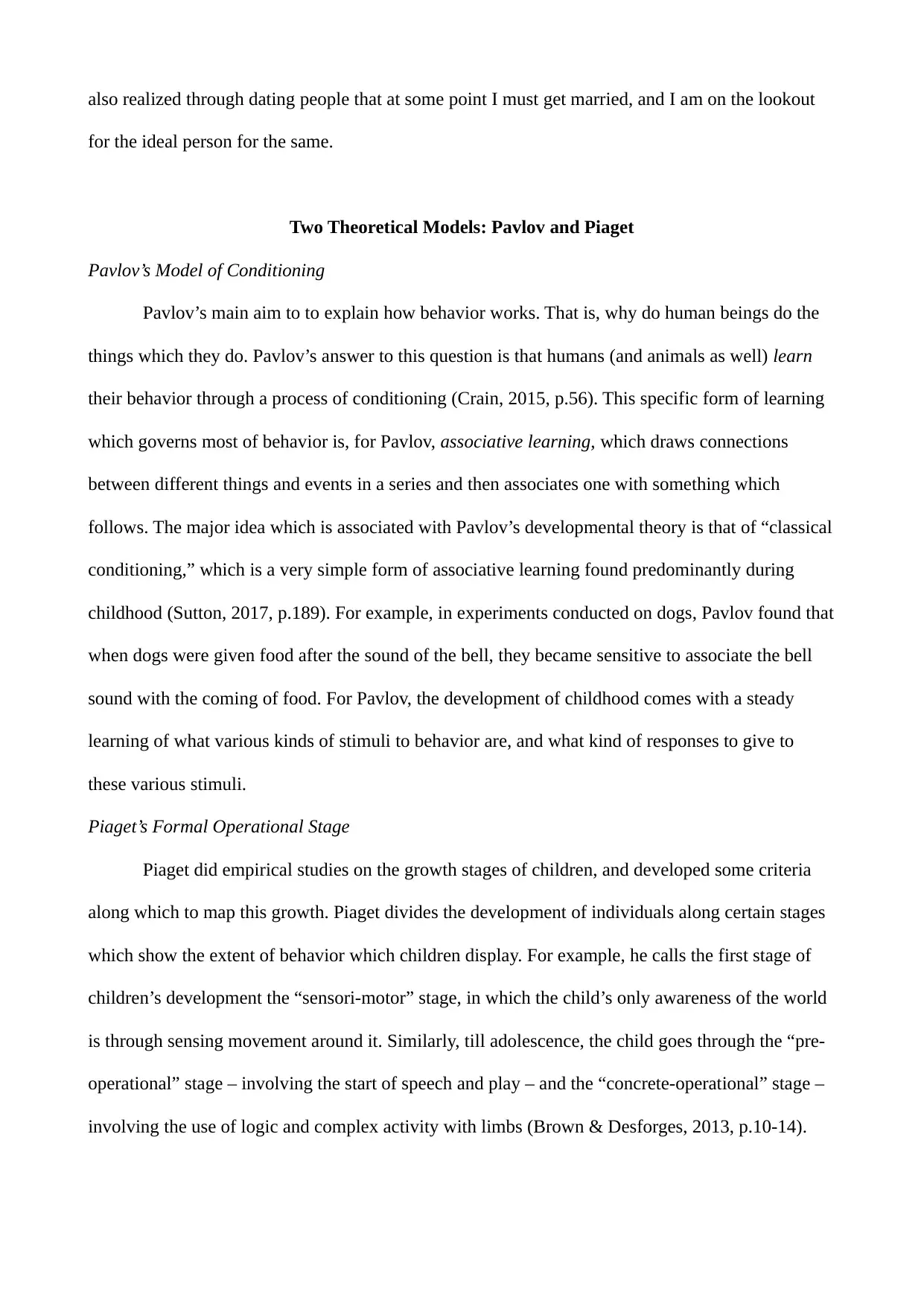
also realized through dating people that at some point I must get married, and I am on the lookout
for the ideal person for the same.
Two Theoretical Models: Pavlov and Piaget
Pavlov’s Model of Conditioning
Pavlov’s main aim to to explain how behavior works. That is, why do human beings do the
things which they do. Pavlov’s answer to this question is that humans (and animals as well) learn
their behavior through a process of conditioning (Crain, 2015, p.56). This specific form of learning
which governs most of behavior is, for Pavlov, associative learning, which draws connections
between different things and events in a series and then associates one with something which
follows. The major idea which is associated with Pavlov’s developmental theory is that of “classical
conditioning,” which is a very simple form of associative learning found predominantly during
childhood (Sutton, 2017, p.189). For example, in experiments conducted on dogs, Pavlov found that
when dogs were given food after the sound of the bell, they became sensitive to associate the bell
sound with the coming of food. For Pavlov, the development of childhood comes with a steady
learning of what various kinds of stimuli to behavior are, and what kind of responses to give to
these various stimuli.
Piaget’s Formal Operational Stage
Piaget did empirical studies on the growth stages of children, and developed some criteria
along which to map this growth. Piaget divides the development of individuals along certain stages
which show the extent of behavior which children display. For example, he calls the first stage of
children’s development the “sensori-motor” stage, in which the child’s only awareness of the world
is through sensing movement around it. Similarly, till adolescence, the child goes through the “pre-
operational” stage – involving the start of speech and play – and the “concrete-operational” stage –
involving the use of logic and complex activity with limbs (Brown & Desforges, 2013, p.10-14).
for the ideal person for the same.
Two Theoretical Models: Pavlov and Piaget
Pavlov’s Model of Conditioning
Pavlov’s main aim to to explain how behavior works. That is, why do human beings do the
things which they do. Pavlov’s answer to this question is that humans (and animals as well) learn
their behavior through a process of conditioning (Crain, 2015, p.56). This specific form of learning
which governs most of behavior is, for Pavlov, associative learning, which draws connections
between different things and events in a series and then associates one with something which
follows. The major idea which is associated with Pavlov’s developmental theory is that of “classical
conditioning,” which is a very simple form of associative learning found predominantly during
childhood (Sutton, 2017, p.189). For example, in experiments conducted on dogs, Pavlov found that
when dogs were given food after the sound of the bell, they became sensitive to associate the bell
sound with the coming of food. For Pavlov, the development of childhood comes with a steady
learning of what various kinds of stimuli to behavior are, and what kind of responses to give to
these various stimuli.
Piaget’s Formal Operational Stage
Piaget did empirical studies on the growth stages of children, and developed some criteria
along which to map this growth. Piaget divides the development of individuals along certain stages
which show the extent of behavior which children display. For example, he calls the first stage of
children’s development the “sensori-motor” stage, in which the child’s only awareness of the world
is through sensing movement around it. Similarly, till adolescence, the child goes through the “pre-
operational” stage – involving the start of speech and play – and the “concrete-operational” stage –
involving the use of logic and complex activity with limbs (Brown & Desforges, 2013, p.10-14).
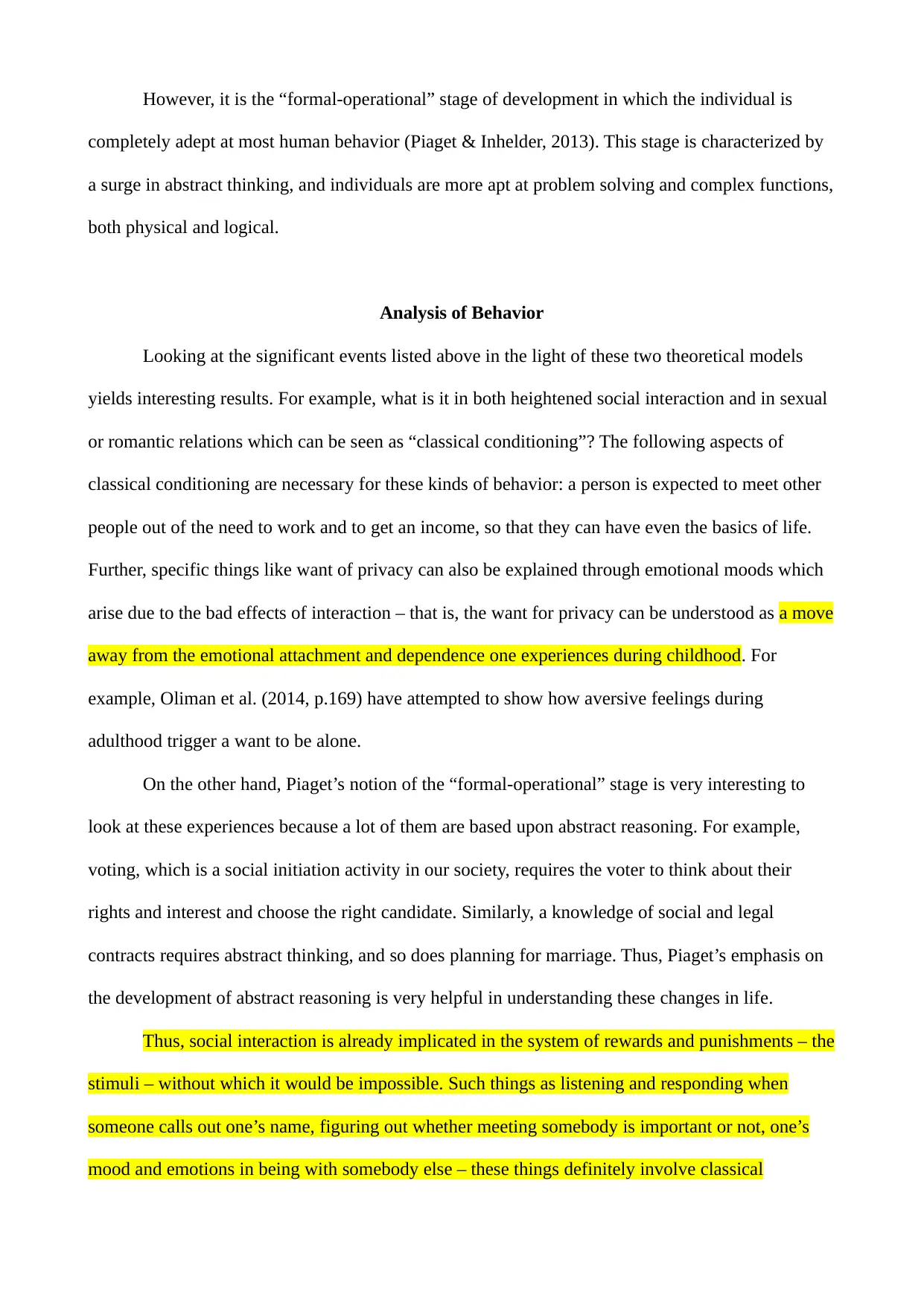
However, it is the “formal-operational” stage of development in which the individual is
completely adept at most human behavior (Piaget & Inhelder, 2013). This stage is characterized by
a surge in abstract thinking, and individuals are more apt at problem solving and complex functions,
both physical and logical.
Analysis of Behavior
Looking at the significant events listed above in the light of these two theoretical models
yields interesting results. For example, what is it in both heightened social interaction and in sexual
or romantic relations which can be seen as “classical conditioning”? The following aspects of
classical conditioning are necessary for these kinds of behavior: a person is expected to meet other
people out of the need to work and to get an income, so that they can have even the basics of life.
Further, specific things like want of privacy can also be explained through emotional moods which
arise due to the bad effects of interaction – that is, the want for privacy can be understood as a move
away from the emotional attachment and dependence one experiences during childhood. For
example, Oliman et al. (2014, p.169) have attempted to show how aversive feelings during
adulthood trigger a want to be alone.
On the other hand, Piaget’s notion of the “formal-operational” stage is very interesting to
look at these experiences because a lot of them are based upon abstract reasoning. For example,
voting, which is a social initiation activity in our society, requires the voter to think about their
rights and interest and choose the right candidate. Similarly, a knowledge of social and legal
contracts requires abstract thinking, and so does planning for marriage. Thus, Piaget’s emphasis on
the development of abstract reasoning is very helpful in understanding these changes in life.
Thus, social interaction is already implicated in the system of rewards and punishments – the
stimuli – without which it would be impossible. Such things as listening and responding when
someone calls out one’s name, figuring out whether meeting somebody is important or not, one’s
mood and emotions in being with somebody else – these things definitely involve classical
completely adept at most human behavior (Piaget & Inhelder, 2013). This stage is characterized by
a surge in abstract thinking, and individuals are more apt at problem solving and complex functions,
both physical and logical.
Analysis of Behavior
Looking at the significant events listed above in the light of these two theoretical models
yields interesting results. For example, what is it in both heightened social interaction and in sexual
or romantic relations which can be seen as “classical conditioning”? The following aspects of
classical conditioning are necessary for these kinds of behavior: a person is expected to meet other
people out of the need to work and to get an income, so that they can have even the basics of life.
Further, specific things like want of privacy can also be explained through emotional moods which
arise due to the bad effects of interaction – that is, the want for privacy can be understood as a move
away from the emotional attachment and dependence one experiences during childhood. For
example, Oliman et al. (2014, p.169) have attempted to show how aversive feelings during
adulthood trigger a want to be alone.
On the other hand, Piaget’s notion of the “formal-operational” stage is very interesting to
look at these experiences because a lot of them are based upon abstract reasoning. For example,
voting, which is a social initiation activity in our society, requires the voter to think about their
rights and interest and choose the right candidate. Similarly, a knowledge of social and legal
contracts requires abstract thinking, and so does planning for marriage. Thus, Piaget’s emphasis on
the development of abstract reasoning is very helpful in understanding these changes in life.
Thus, social interaction is already implicated in the system of rewards and punishments – the
stimuli – without which it would be impossible. Such things as listening and responding when
someone calls out one’s name, figuring out whether meeting somebody is important or not, one’s
mood and emotions in being with somebody else – these things definitely involve classical
Secure Best Marks with AI Grader
Need help grading? Try our AI Grader for instant feedback on your assignments.
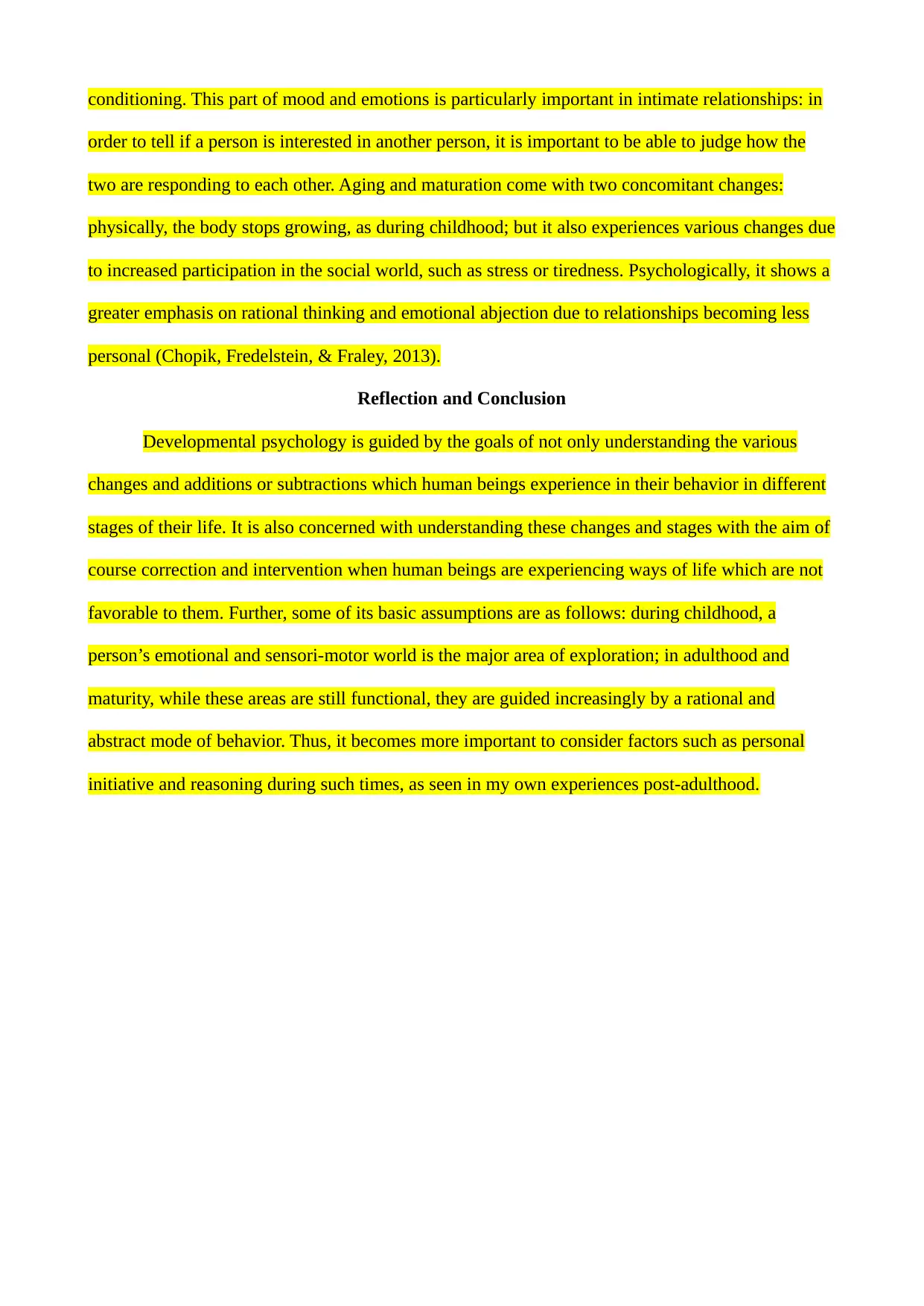
conditioning. This part of mood and emotions is particularly important in intimate relationships: in
order to tell if a person is interested in another person, it is important to be able to judge how the
two are responding to each other. Aging and maturation come with two concomitant changes:
physically, the body stops growing, as during childhood; but it also experiences various changes due
to increased participation in the social world, such as stress or tiredness. Psychologically, it shows a
greater emphasis on rational thinking and emotional abjection due to relationships becoming less
personal (Chopik, Fredelstein, & Fraley, 2013).
Reflection and Conclusion
Developmental psychology is guided by the goals of not only understanding the various
changes and additions or subtractions which human beings experience in their behavior in different
stages of their life. It is also concerned with understanding these changes and stages with the aim of
course correction and intervention when human beings are experiencing ways of life which are not
favorable to them. Further, some of its basic assumptions are as follows: during childhood, a
person’s emotional and sensori-motor world is the major area of exploration; in adulthood and
maturity, while these areas are still functional, they are guided increasingly by a rational and
abstract mode of behavior. Thus, it becomes more important to consider factors such as personal
initiative and reasoning during such times, as seen in my own experiences post-adulthood.
order to tell if a person is interested in another person, it is important to be able to judge how the
two are responding to each other. Aging and maturation come with two concomitant changes:
physically, the body stops growing, as during childhood; but it also experiences various changes due
to increased participation in the social world, such as stress or tiredness. Psychologically, it shows a
greater emphasis on rational thinking and emotional abjection due to relationships becoming less
personal (Chopik, Fredelstein, & Fraley, 2013).
Reflection and Conclusion
Developmental psychology is guided by the goals of not only understanding the various
changes and additions or subtractions which human beings experience in their behavior in different
stages of their life. It is also concerned with understanding these changes and stages with the aim of
course correction and intervention when human beings are experiencing ways of life which are not
favorable to them. Further, some of its basic assumptions are as follows: during childhood, a
person’s emotional and sensori-motor world is the major area of exploration; in adulthood and
maturity, while these areas are still functional, they are guided increasingly by a rational and
abstract mode of behavior. Thus, it becomes more important to consider factors such as personal
initiative and reasoning during such times, as seen in my own experiences post-adulthood.
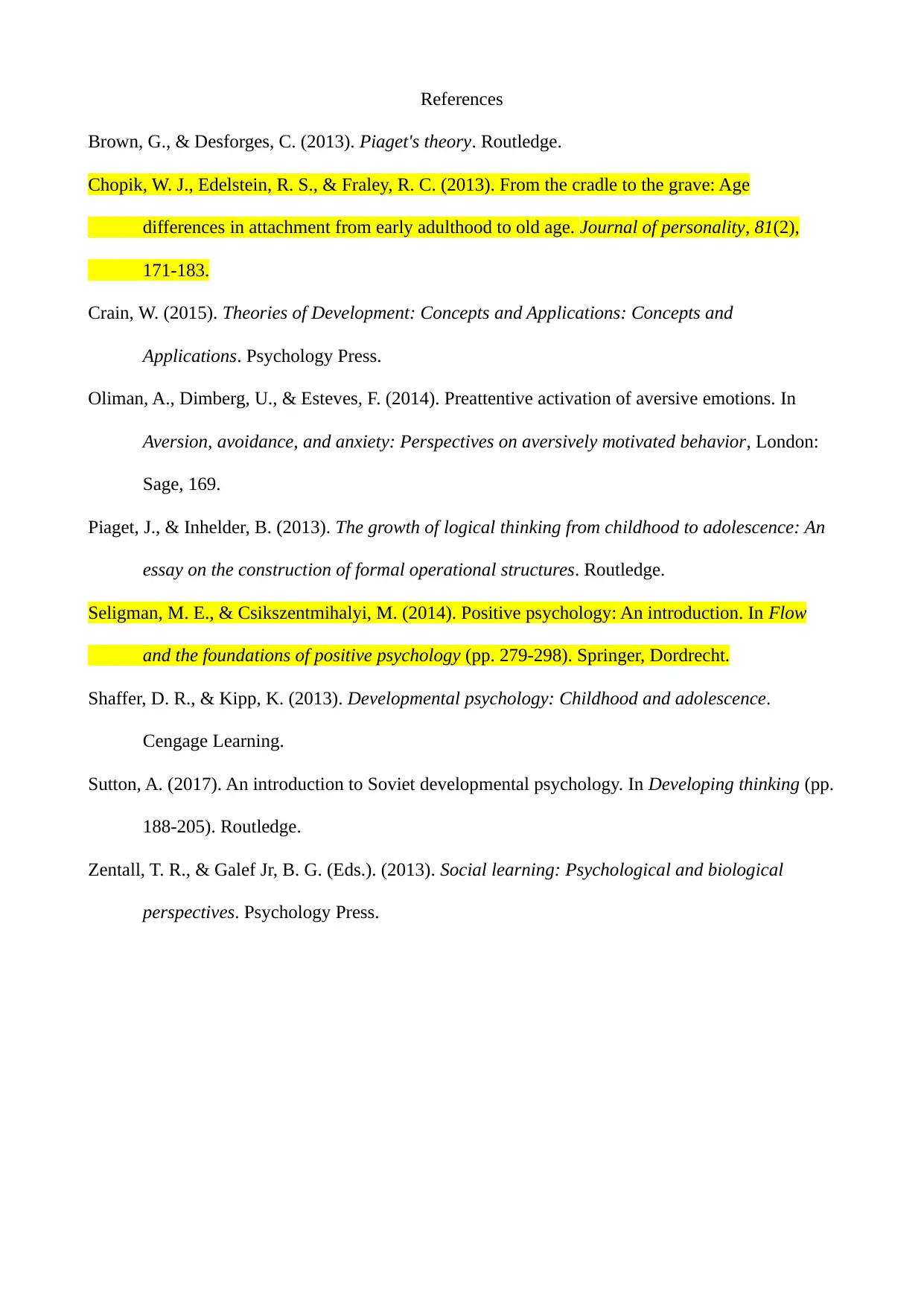
References
Brown, G., & Desforges, C. (2013). Piaget's theory. Routledge.
Chopik, W. J., Edelstein, R. S., & Fraley, R. C. (2013). From the cradle to the grave: Age
differences in attachment from early adulthood to old age. Journal of personality, 81(2),
171-183.
Crain, W. (2015). Theories of Development: Concepts and Applications: Concepts and
Applications. Psychology Press.
Oliman, A., Dimberg, U., & Esteves, F. (2014). Preattentive activation of aversive emotions. In
Aversion, avoidance, and anxiety: Perspectives on aversively motivated behavior, London:
Sage, 169.
Piaget, J., & Inhelder, B. (2013). The growth of logical thinking from childhood to adolescence: An
essay on the construction of formal operational structures. Routledge.
Seligman, M. E., & Csikszentmihalyi, M. (2014). Positive psychology: An introduction. In Flow
and the foundations of positive psychology (pp. 279-298). Springer, Dordrecht.
Shaffer, D. R., & Kipp, K. (2013). Developmental psychology: Childhood and adolescence.
Cengage Learning.
Sutton, A. (2017). An introduction to Soviet developmental psychology. In Developing thinking (pp.
188-205). Routledge.
Zentall, T. R., & Galef Jr, B. G. (Eds.). (2013). Social learning: Psychological and biological
perspectives. Psychology Press.
Brown, G., & Desforges, C. (2013). Piaget's theory. Routledge.
Chopik, W. J., Edelstein, R. S., & Fraley, R. C. (2013). From the cradle to the grave: Age
differences in attachment from early adulthood to old age. Journal of personality, 81(2),
171-183.
Crain, W. (2015). Theories of Development: Concepts and Applications: Concepts and
Applications. Psychology Press.
Oliman, A., Dimberg, U., & Esteves, F. (2014). Preattentive activation of aversive emotions. In
Aversion, avoidance, and anxiety: Perspectives on aversively motivated behavior, London:
Sage, 169.
Piaget, J., & Inhelder, B. (2013). The growth of logical thinking from childhood to adolescence: An
essay on the construction of formal operational structures. Routledge.
Seligman, M. E., & Csikszentmihalyi, M. (2014). Positive psychology: An introduction. In Flow
and the foundations of positive psychology (pp. 279-298). Springer, Dordrecht.
Shaffer, D. R., & Kipp, K. (2013). Developmental psychology: Childhood and adolescence.
Cengage Learning.
Sutton, A. (2017). An introduction to Soviet developmental psychology. In Developing thinking (pp.
188-205). Routledge.
Zentall, T. R., & Galef Jr, B. G. (Eds.). (2013). Social learning: Psychological and biological
perspectives. Psychology Press.
1 out of 6
Related Documents
Your All-in-One AI-Powered Toolkit for Academic Success.
+13062052269
info@desklib.com
Available 24*7 on WhatsApp / Email
![[object Object]](/_next/static/media/star-bottom.7253800d.svg)
Unlock your academic potential
© 2024 | Zucol Services PVT LTD | All rights reserved.





